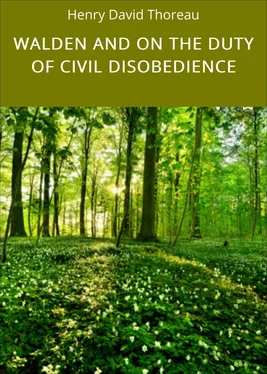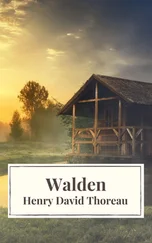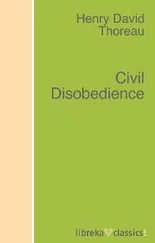beings in the various mansions of the universe are contemplating the
same one at the same moment! Nature and human life are as various as
our several constitutions. Who shall say what prospect life offers to
another? Could a greater miracle take place than for us to look through
each other’s eyes for an instant? We should live in all the ages of the
world in an hour; ay, in all the worlds of the ages. History, Poetry,
Mythology!—I know of no reading of another’s experience so startling
and informing as this would be.
The greater part of what my neighbors call good I believe in my soul to
be bad, and if I repent of anything, it is very likely to be my good
behavior. What demon possessed me that I behaved so well? You may say
the wisest thing you can, old man,—you who have lived seventy years,
not without honor of a kind,—I hear an irresistible voice which invites
me away from all that. One generation abandons the enterprises of
another like stranded vessels.
I think that we may safely trust a good deal more than we do. We may
waive just so much care of ourselves as we honestly bestow elsewhere.
Nature is as well adapted to our weakness as to our strength. The
incessant anxiety and strain of some is a well nigh incurable form of
disease. We are made to exaggerate the importance of what work we do;
and yet how much is not done by us! or, what if we had been taken sick?
How vigilant we are! determined not to live by faith if we can avoid
it; all the day long on the alert, at night we unwillingly say our
prayers and commit ourselves to uncertainties. So thoroughly and
sincerely are we compelled to live, reverencing our life, and denying
the possibility of change. This is the only way, we say; but there are
as many ways as there can be drawn radii from one centre. All change is
a miracle to contemplate; but it is a miracle which is taking place
every instant. Confucius said, “To know that we know what we know, and
that we do not know what we do not know, that is true knowledge.” When
one man has reduced a fact of the imagination to be a fact to his
understanding, I foresee that all men at length establish their lives
on that basis.
Let us consider for a moment what most of the trouble and anxiety which
I have referred to is about, and how much it is necessary that we be
troubled, or, at least, careful. It would be some advantage to live a
primitive and frontier life, though in the midst of an outward
civilization, if only to learn what are the gross necessaries of life
and what methods have been taken to obtain them; or even to look over
the old day-books of the merchants, to see what it was that men most
commonly bought at the stores, what they stored, that is, what are the
grossest groceries. For the improvements of ages have had but little
influence on the essential laws of man’s existence; as our skeletons,
probably, are not to be distinguished from those of our ancestors.
By the words, _necessary of life_, I mean whatever, of all that man
obtains by his own exertions, has been from the first, or from long use
has become, so important to human life that few, if any, whether from
savageness, or poverty, or philosophy, ever attempt to do without it.
To many creatures there is in this sense but one necessary of life,
Food. To the bison of the prairie it is a few inches of palatable
grass, with water to drink; unless he seeks the Shelter of the forest
or the mountain’s shadow. None of the brute creation requires more than
Food and Shelter. The necessaries of life for man in this climate may,
accurately enough, be distributed under the several heads of Food,
Shelter, Clothing, and Fuel; for not till we have secured these are we
prepared to entertain the true problems of life with freedom and a
prospect of success. Man has invented, not only houses, but clothes and
cooked food; and possibly from the accidental discovery of the warmth
of fire, and the consequent use of it, at first a luxury, arose the
present necessity to sit by it. We observe cats and dogs acquiring the
same second nature. By proper Shelter and Clothing we legitimately
retain our own internal heat; but with an excess of these, or of Fuel,
that is, with an external heat greater than our own internal, may not
cookery properly be said to begin? Darwin, the naturalist, says of the
inhabitants of Tierra del Fuego, that while his own party, who were
well clothed and sitting close to a fire, were far from too warm, these
naked savages, who were farther off, were observed, to his great
surprise, “to be streaming with perspiration at undergoing such a
roasting.” So, we are told, the New Hollander goes naked with impunity,
while the European shivers in his clothes. Is it impossible to combine
the hardiness of these savages with the intellectualness of the
civilized man? According to Liebig, man’s body is a stove, and food the
fuel which keeps up the internal combustion in the lungs. In cold
weather we eat more, in warm less. The animal heat is the result of a
slow combustion, and disease and death take place when this is too
rapid; or for want of fuel, or from some defect in the draught, the
fire goes out. Of course the vital heat is not to be confounded with
fire; but so much for analogy. It appears, therefore, from the above
list, that the expression, _animal life_, is nearly synonymous with the
expression, _animal heat_; for while Food may be regarded as the Fuel
which keeps up the fire within us,—and Fuel serves only to prepare that
Food or to increase the warmth of our bodies by addition from
without,—Shelter and Clothing also serve only to retain the _heat_ thus
generated and absorbed.
The grand necessity, then, for our bodies, is to keep warm, to keep the
vital heat in us. What pains we accordingly take, not only with our
Food, and Clothing, and Shelter, but with our beds, which are our
night-clothes, robbing the nests and breasts of birds to prepare this
shelter within a shelter, as the mole has its bed of grass and leaves
at the end of its burrow! The poor man is wont to complain that this is
a cold world; and to cold, no less physical than social, we refer
directly a great part of our ails. The summer, in some climates, makes
possible to man a sort of Elysian life. Fuel, except to cook his Food,
is then unnecessary; the sun is his fire, and many of the fruits are
sufficiently cooked by its rays; while Food generally is more various,
and more easily obtained, and Clothing and Shelter are wholly or half
unnecessary. At the present day, and in this country, as I find by my
own experience, a few implements, a knife, an axe, a spade, a
wheelbarrow, &c., and for the studious, lamplight, stationery, and
access to a few books, rank next to necessaries, and can all be
obtained at a trifling cost. Yet some, not wise, go to the other side
of the globe, to barbarous and unhealthy regions, and devote themselves
to trade for ten or twenty years, in order that they may live,—that is,
keep comfortably warm,—and die in New England at last. The luxuriously
rich are not simply kept comfortably warm, but unnaturally hot; as I
implied before, they are cooked, of course _à la mode_.
Most of the luxuries, and many of the so called comforts of life, are
not only not indispensable, but positive hindrances to the elevation of
mankind. With respect to luxuries and comforts, the wisest have ever
Читать дальше












